11 Things You Need to Know About Betsy DeVos
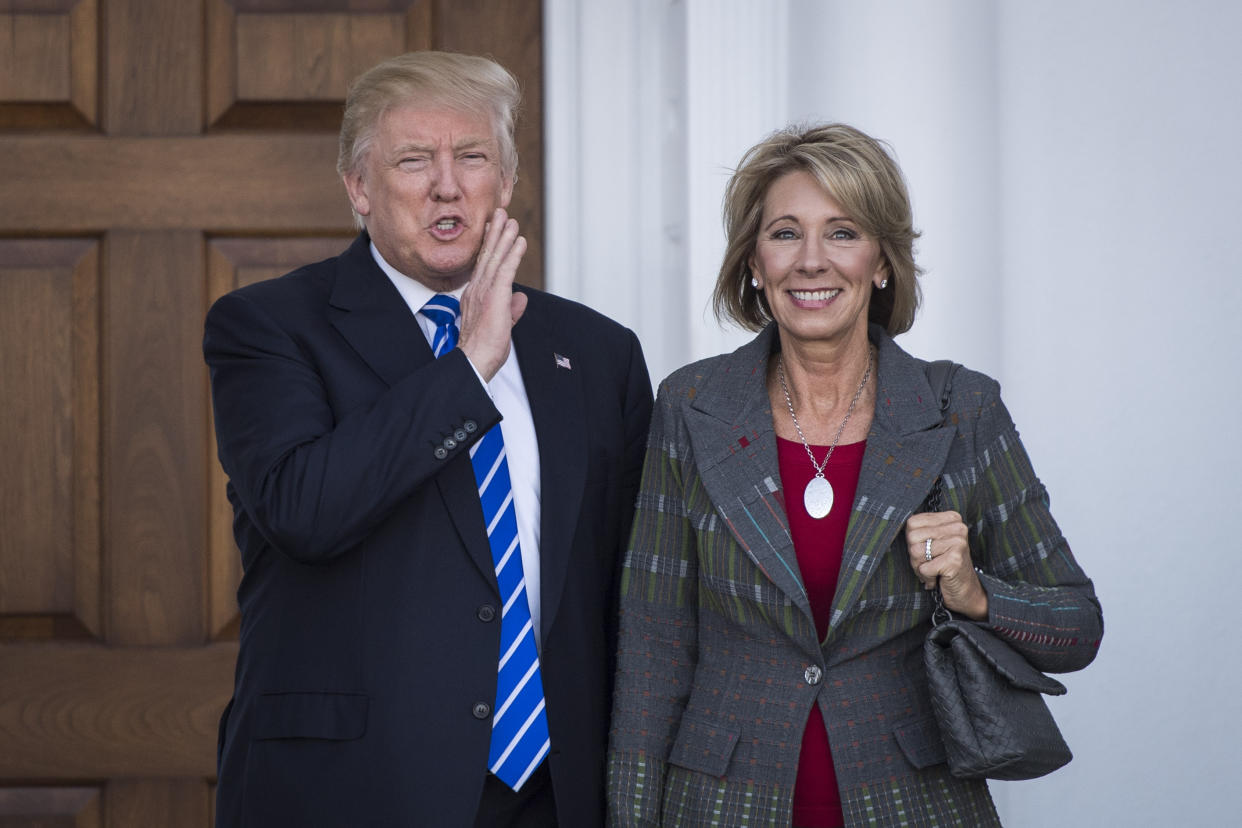
President Donald Trump named Elisabeth "Betsy" DeVos as his choice for education secretary in November, and on Feb. 7, the Senate voted largely along party lines to confirm her. Republican Sens. Susan Collins and Lisa Murkowski broke rank and Vice President Mike Pence acted as the tiebreaker.
DeVos will lead the Department of Education, setting education policy and "prohibiting discrimination and ensuring equal access to education," according to the department's mission statement.
DeVos, 59, was born and raised in Holland, in Western Michigan. She has been an active member of the Republican party since her 20s but has not held an elected office. She also has no prior experience working in education, though she has spent decades advocating for school voucher programs and the privatization of schools.
Here's what you need to know about Betsy DeVos:
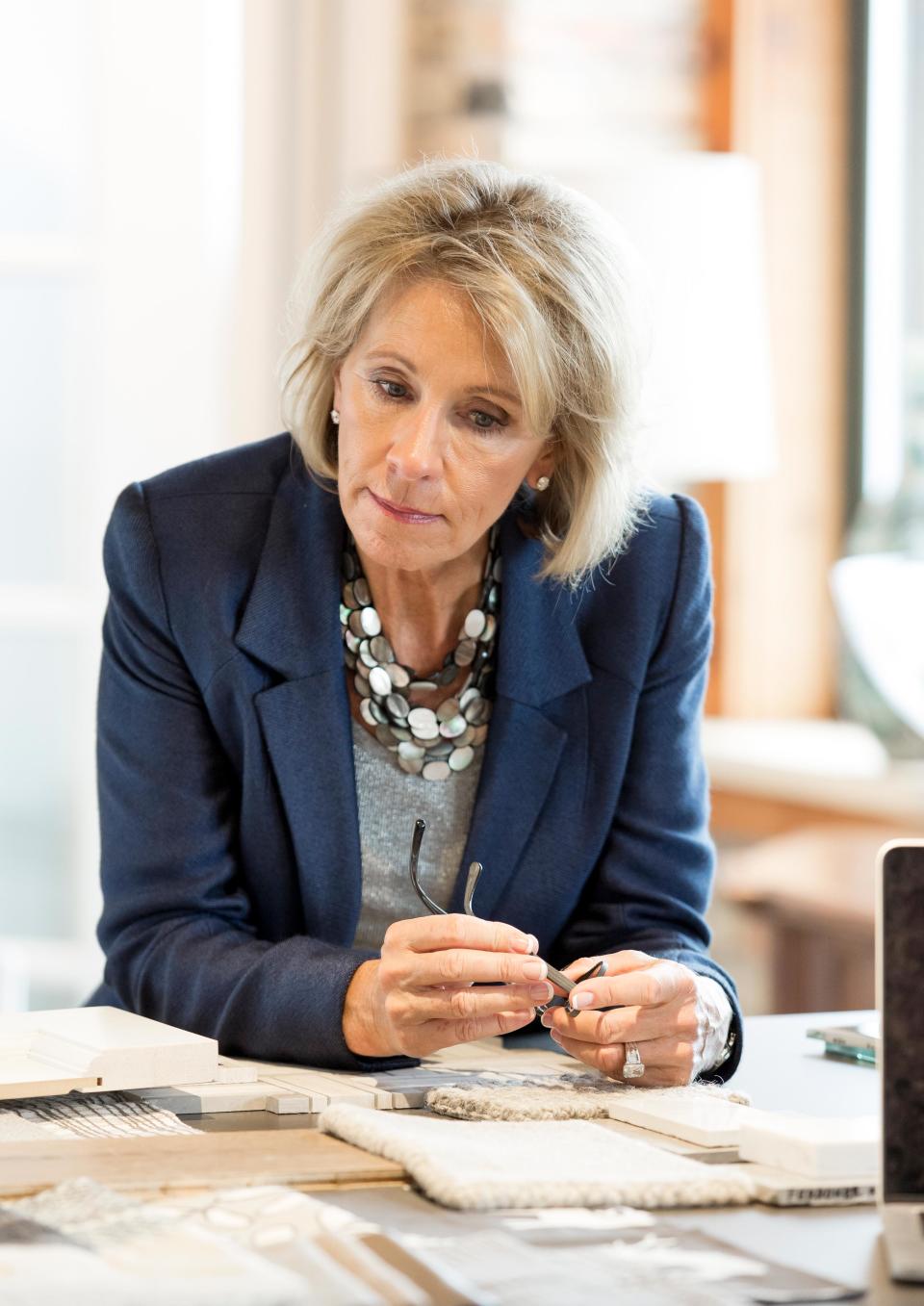
1. She is a billionaire.
DeVos's father, Edgar Prince, was a billionaire Michigan industrialist who founded the Prince Corporation, an auto parts manufacturing company. Following Prince's death, Johnson Controls bought the business for $1.35 billion in 1996.
DeVos's husband, Dick DeVos Jr., is the son of Dick DeVos Sr., the self-made multi-billionaire co-founder of the Amway Corporation and owner of the Orlando Magic. The DeVos family is among the richest people not only in Michigan, but the world.
Betsy DeVos is the chair of the Windquest Group, an investment management firm she started with her husband. The DeVoses own multiple residences in their home state, including a 22,000-square-foot mansion on a lake, and also have a vacation home in Florida, which Vero Beach 32963 describes as "a virtual compound" with "expansive golf views." In her Vero Beach 32963 profile, DeVos said, "Social justice and economics are both issues to me."
2. She is a devout Christian conservative.
DeVos attended Calvin College, a Christian Reformed school in Michigan, and has made significant donations to her alma mater. Prior to that, she went to Holland Christian High School, a Christian Reformed school in her hometown.
She has stated that her mission in education is to "advance God's kingdom," according to Politico. It runs in the family: When her father died, the conservative Gary Bauer said, "Ed Prince was not an empire builder. He was a Kingdom Builder." DeVos's parents and in-laws have "supported anti-gay marriage efforts in the past," according to the Washington Post, though DeVos personally appears to have more tolerant views of gay rights. DeVos has given money to and once served on the board of the Acton Institute, a conservative organization that promotes dominion theology.
DeVos has been supportive of (and found support in) Vice President-elect Mike Pence, another Christian conservative who as governor of Indiana helped advance school voucher programs.
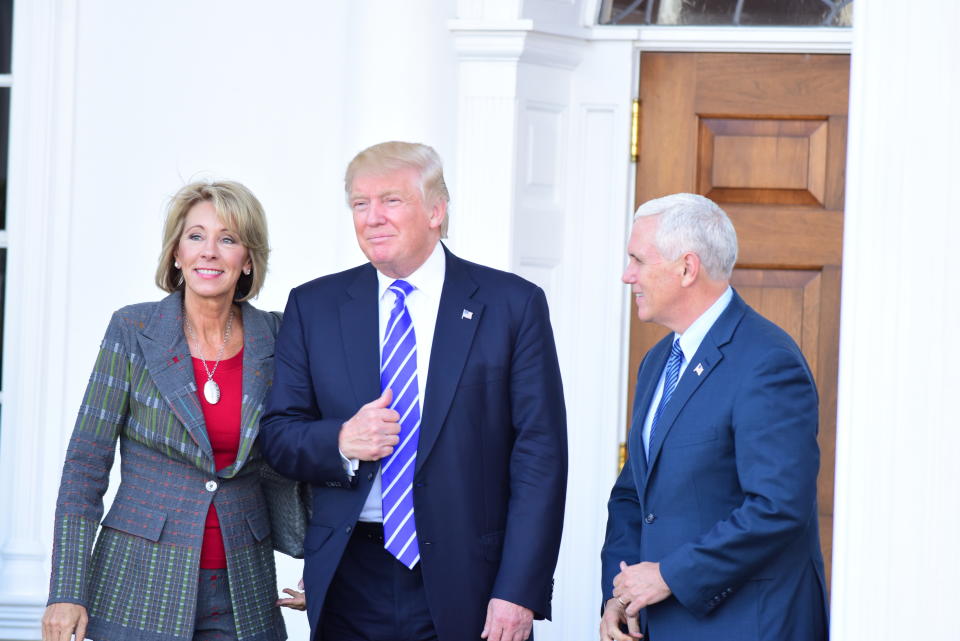
3. She has no experience working in education.
Unlike the current secretary of education, John King Jr., who was a former teacher and public school administrator, DeVos has never held a professional position as an educator. She neither studied education in school. Sen. Elizabeth Warren of Massachusetts has criticized DeVos, saying in a 16-page letter that "there is no precedent for an Education Department Secretary nominee with your lack of experience in public education." DeVos has supporters in Mitt Romney and Jeb Bush, among others in the Republican party.
In the realm of education, DeVos has primarily been a political activist and philanthropist. One of her early experiences in education philanthropy started at Potter's House Christian School in Michigan. "We knew we had the resources to send our kids to whatever school was best for them," she said in an interview with Philanthropy in 2013. "For these parents, however, paying tuition was a real sacrifice. We started supporting individual students at the school, and that grew into a larger commitment."
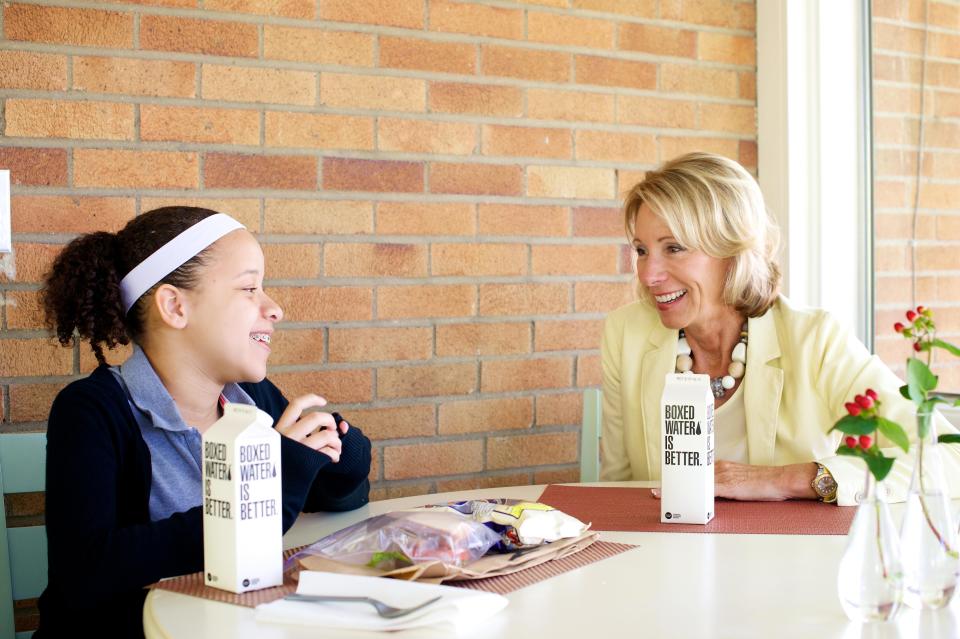
4. Her primary cause of activism has been school choice.
It has been DeVos and her husband's main fight for over 20 years. Having attended and sent her children to private schools, DeVos says she want every family to have "educational choice," the umbrella term used to describe efforts to privatize education by, among other methods, installing school voucher programs, which divert public funding to private and religious schools.
In her 2013 interview with Philanthropy, DeVos expressed support for vouchers, private schools, charter schools, homeschooling, and "digital learning" as viable options under educational choice, but did not name public schools. DeVos wrote in an op-ed for the Detroit News in 2016 that the Detroit public schools system should be replaced entirely with a free-market system. (Dick DeVos, who served on the State Board of Education in Michigan in 1990, said in 2002 that public schools should be called "government schools." He also launched a charter aviation school in Michigan, which the New Yorker notes is "overwhelmingly white, overwhelmingly male.")
Critics of voucher programs say they "exacerbate existing inequalities" and in the U.S. amount to an attempt to bring segregation back to the school system. Vouchers were introduced after the Supreme Court ruled on Brown v. Board of Education. "Vouchers and the market provided a barrier for African Americans to continue their education," Erica Frankenberg, associate professor in the Department of Education Policy Studies in the College of Education at Pennsylvania State University, told Think Progress. "We have quite frankly very similar things happening today." Proponents of vouchers and school choice, which include Trump, see them as a tool in privatizing education and turning it into a free-market system. (According to the New York Times, economists don't see this as a good idea.)
The DeVoses' efforts in education are principally motivated by their religious beliefs. At a conference for wealthy Christians called The Gathering, according to Politico, DeVos said she felt compelled "to impact our culture in ways that are not the traditional funding the Christian organization route, but really may have greater kingdom gain in the long run by changing the way we approach things, in this case the system of education in our country."
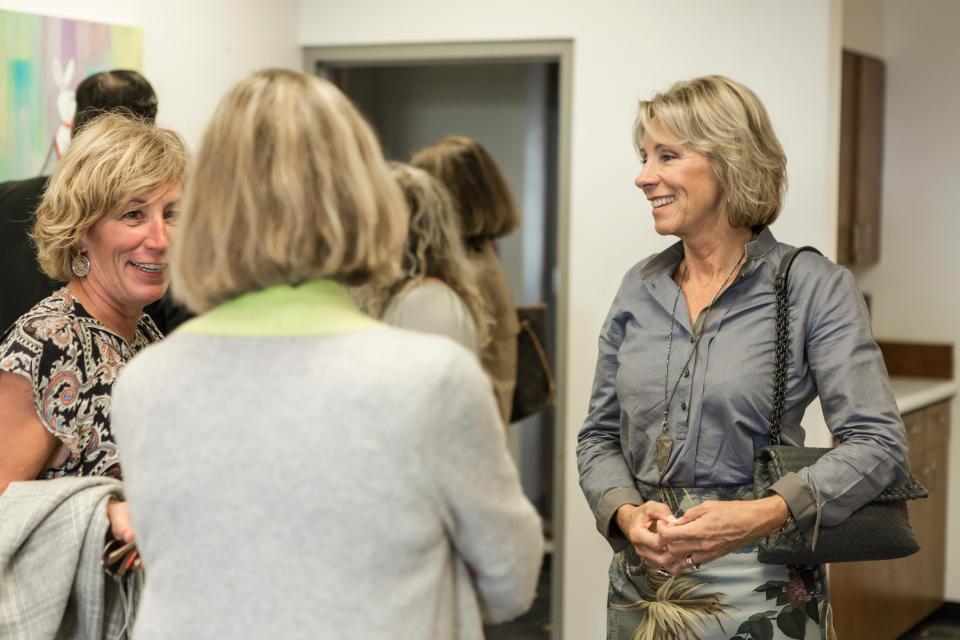
The DeVoses' efforts are also highly organized and strategic. After trying and failing to get voucher legislation passed in Michigan in 2000, they shifted to what Dick DeVos called a "stealth" grassroots strategy, which he outlined in his 2002 speech at the Heritage Foundation. "This has got to be the battle," he said. "It will not be as visible." The DeVoses began leveraging a dizzying number of political fundraising and nonprofit organizations to advance their school choice agenda on a local level.
DeVos started a political action committee in 2001 called the Great Lakes Education Project (GLEP), which funds legislation and political candidates. The DeVoses have contributed $2 million to GLEP since 2001, according to the Detroit Free Press. "GLEP has spent that money essentially buying policy outcomes that have helped Michigan's charter industry grow while shielding it from accountability," writes Stephen Henderson, the editorial page editor of the Free Press.
In addition, DeVos chairs the American Federation for Children. She is on the board of the Alliance for School Choice, the Education Freedom Fund, and the Foundation for Excellence in Education. She formerly chaired All Children Matter, a group that was started by her husband and later fined $5.3 million for violating election laws.
On Feb. 1, Eli Broad - a billionaire philanthropist and supporter of charter schools - wrote a letter (here's page one and page two) to Senators Mitch McConnell and Chuck Schumer opposing DeVos's nomination. "At the risk of stating the obvious, we must have a Secretary of Education who believes in public education and the need to keep public schools public," he wrote. "With Betsy DeVos at the helm of the U.S. Department of Education, much of the good work that has been accomplished to improve public education for all of America’s children could be undone."
5. Her education reform record in Michigan is seen as poor.
Michigan is "among the worst places to argue that choice has made schools better," according to the New York Times. "Most charter schools perform below the state average."
An investigation by the Detroit Free Press in 2014 found that Michigan's charter schools "rake in taxpayer money and refuse to detail how they spend it," that charter school employees and board members were "steering lucrative deals to themselves or insiders," and that more charter schools were ranking below the 25th percentile than public schools. Even a charter advocate, former state schools superintendent Tom Watkins, said, "People are making a boatload of money, and the kids aren't getting educated."
Trump's choice of DeVos has been lambasted by teachers' unions (she doesn't like them either; the DeVoses oppose labor unions). "It's like putting the fox in charge of the henhouse, and hand-feeding it schoolchildren," said David Hecker, president of American Federation of Teachers-Michigan. In a statement, the president of the American Federation of Teachers, Randi Weingarten, said, "In nominating DeVos, Trump makes it loud and clear that his education policy will focus on privatizing, defunding and destroying public education in America." While the National Education Association president Lily Eskelsen Garcia said that "Betsy DeVos is an actual danger to students - especially our most vulnerable students. She has made a career trying to destroy neighborhood public schools, the very cornerstone of what's made our nation so strong."
6. She is a powerful Republican donor.
Several outlets, including the Washington Post, Politico, and the New York Times, have reported on the DeVos family's extensive political donations (they have given $200 million to right-wing causes since 1970, according to a Mother Jones piece from 2014). Betsy DeVos has personally given money to senators on the Committee on Health, Education, Labor and Pensions, which will oversee her confirmation hearing.
DeVos's brother Erik Prince, who founded the notorious private military contracting firm Blackwater (now known as Academi), is a vocal Trump supporter who has spoken with Breitbart News in favor of Trump and gave at least $100,000 to the pro-Trump super PAC Make America Number 1 PAC. "During the 2014 and 2016 election cycles, DeVos and her relatives gave at least $818,000 to 20 current Republican senators," according to the Washington Post. DeVos's critics have said that the breadth of the family's donations represent a significant conflict of interest, especially for the senators on the committee.
"She is the most emblematic kind of oligarchic figure you can put in a cabinet position," the political scientist Jeffrey Winters told the New York Times. "What she and the Kochs [Charles and David] have in common is the unbridled use of power to achieve whatever political goals they have." According to Times, DeVos is one of the forces behind Citizens United.
7. She has been open about expecting influence in exchange for campaign contributions.
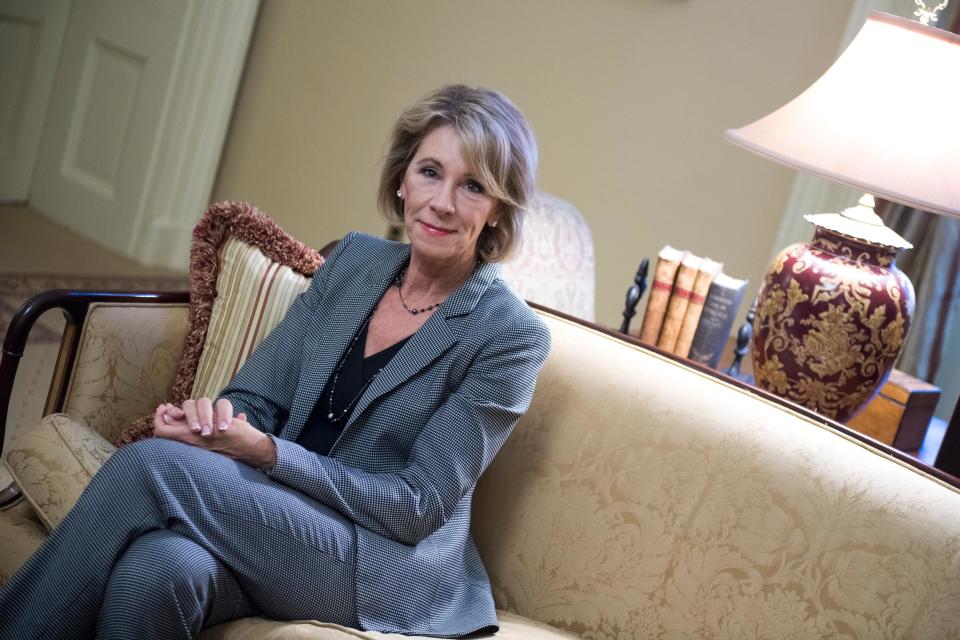
In 1997, DeVos wrote the following in an essay for Roll Call: "I know a little something about soft money, as my family is the largest single contributor of soft money to the national Republican party. Occasionally a wayward reporter will try to make the charge that we are giving this money to get something in return, or that we must be purchasing influence in some way."
She continued:
I have decided, however, to stop taking offense at the suggestion that we are buying influence. Now I simply concede the point. They are right. We do expect some things in return.
We expect to foster a conservative governing philosophy consisting of limited government and respect for traditional American virtues. We expect a return on our investment; we expect a good and honest government. Furthermore, we expect the Republican party to use the money to promote these policies, and yes, to win elections.
People like us must surely be stopped.
8. She has been politically active since the 1970s.
DeVos was Republican National Committeewoman for Michigan from 1992 to 1997. She chaired the Republican Party in Michigan from 1996 to 2000, and again from 2003 to 2005. Dick DeVos ran as the Republican candidate for governor of Michigan in 2006, spending the most money anyone had ever spent on a gubernatorial campaign in the state, but he was defeated by the Democratic incumbent.
The New York Times describes Betsy DeVos as having a "browbeating" style in politics. "I would never underestimate Betsy DeVos in a knife fight," Randy Richardville, a Republican and former Michigan state senator, told the Times. Another Republican state representative, Mike Pumford, said, "Betsy DeVos was like my 4-year-old granddaughter at the time. They were both sweet ladies as long as they kept hearing the word 'yes.' They turned into spoiled little brats when they were told 'no.'"
9. She did not support Trump for most of the election.
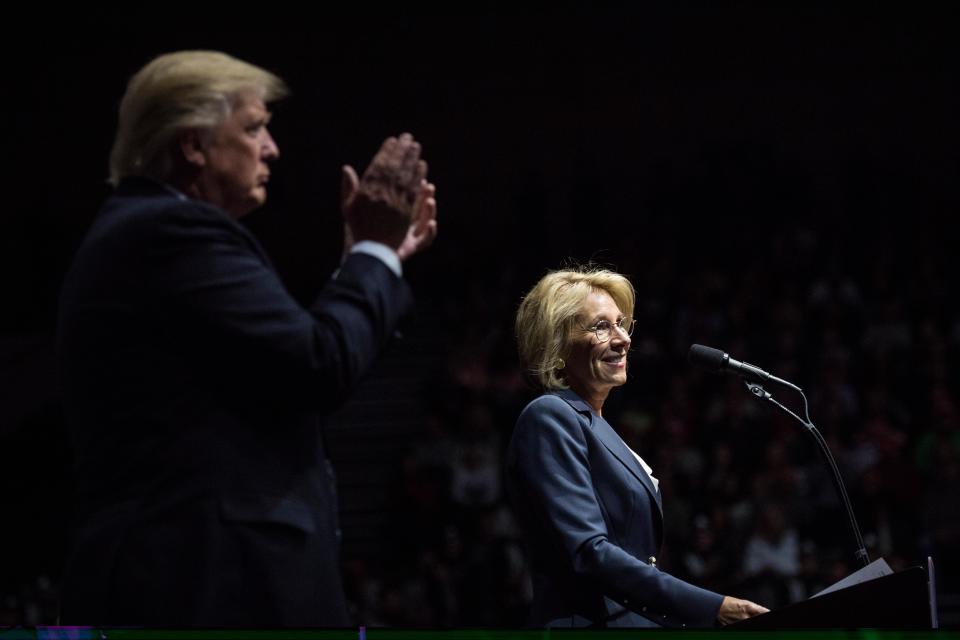
Unlike her brother Erik Prince, DeVos did not initially support Trump's candidacy, backing Marco Rubio and later John Kasich. "I don't think Donald Trump represents the Republican party," DeVos told the Washington Examiner in February 2016, calling him an "interloper." She said, "I think more and more people are going to realize that they really don't trust him. The more they learn about his record, they're going to break away and go to an alternate."
But she did support Pence. And Trump advocated school choice throughout his campaign. When picked for the education secretary job, DeVos tweeted that she was "honored." Trump said that she was "a brilliant and passionate education advocate."
I am honored to work with the President-elect on his vision to make American education great again. The status quo in ed is not acceptable.
- Betsy DeVos (@BetsyDeVos) November 23, 2016
10. She invests in Neurocore, a controversial business that offers dubious "brain performance" services.
According to the New York Times, Neurocore advertises "biofeedback" treatments that purportedly help people, including children, who have been diagnosed with disorders including autism, depression, and anxiety. DeVos and her husband are the chief investors in the company. Experts told the Times that Neurocore's claims may not be true. "This causes real harm to children because it diverts attention, hope and resources," said the child psychiatrist and autism expert Dr. Matthew Siegel. DeVos said she will leave the board but not divest in the company if she is confirmed to be the education secretary.
11. She may have plagiarized language on her Senate questionnaire.
The Washington Post reports that DeVos answered a questionnaire that she submitted on Jan. 30 using sentences from other sources that she did not cite.
In one example, DeVos wrote: "Every child deserves to attend school in a safe, supportive environment where they can learn, thrive, and grow."
While Vanita Gupta, the Principal Deputy Assistant Attorney General and acting head of the Civil Rights Division at the U.S. Department of Justice under the Obama administration, wrote the following sentence in a May 2016 press release: "Every child deserves to attend school in a safe, supportive environment that allows them to thrive and grow."
This post has been updated.
Follow Helin on Instagram.
You Might Also Like


